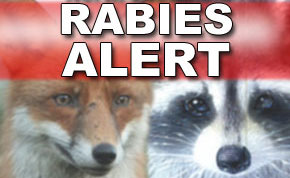Rabies Alert Issued For Portion Of Escambia County
July 16, 2017
The Florida Department of Health in Escambia County (FDOH-Escambia) has issued a rabies advisory for the Warrington and Navy Point areas of Escambia County. The alert does not currently included the North Escambia area; however, the health department is urging everyone to use basic precautions.
FDOH-Escambia urges residents and visitors to protect themselves from the risk of rabies exposure by avoiding contact with wild and stray animals.
 There have been two recent reports of a fox attacking individuals, during the daytime, in both Warrington and Navy Point in Escambia County. The most recent attack, which occurred on July 13, resulted in the fox’s demise after which FDOH-Escambia’s environmental health specialists were able to collect tissue samples from the fox and forward the samples to the state laboratory which has now confirmed the presence of the rabies virus.
There have been two recent reports of a fox attacking individuals, during the daytime, in both Warrington and Navy Point in Escambia County. The most recent attack, which occurred on July 13, resulted in the fox’s demise after which FDOH-Escambia’s environmental health specialists were able to collect tissue samples from the fox and forward the samples to the state laboratory which has now confirmed the presence of the rabies virus.
Rabies is a viral disease that infects the central nervous system. Without proper treatment, rabies can cause brain infection and death. Rabies is transmitted by a rabid animal by a bite, a scratch, or by contact with mucous membranes such as the eyes, nose, or mouth. A series of “rabies shots” can protect a bite victim from developing the rabies infection, if given soon after the bite occurs.
“Rabies is a fatal infection but is preventable,” notes FDOH-Escambia’s director, Dr. John J. Lanza. “It is important to not feed or pet wild and stray animals, to avoid animals that appear to be acting strangely, and to keep pets vaccinated against rabies. Persons who are bitten by a wild animal or an animal who has not been vaccinated against rabies should seek immediate medical care. Proper medical treatment of an animal bite can be life-saving.”
In Florida, raccoons, foxes, bats, and cats are the animals most frequently diagnosed with rabies. Other animals that are at high risk for rabies include dogs, bobcats, skunks, and otters. Because of their proximity to people, stray and unvaccinated cats and dogs pose a special risk.
- You cannot always tell if an animal has rabies by looking at it. To protect yourself and your loved ones against rabies follow these steps:
- Teach your children not to go near wild and stray animals, and never keep them as pets.
- Vaccinate your dog, cat, ferret, or horse to protect against rabies. Keep vaccinations up-to-date.
- Do not feed your pets outside. The food may attract wild animals.
- Make sure your garbage is securely covered. Open garbage attracts wild and stray animals.
- Spay or neuter your pet to reduce its tendency to roam or fight.
- Do not let your pets roam freely or allow them to interact with wild or stray animals. Keep them in a fenced yard or on a leash at all times.
- Call Escambia County Animal Control, at 850-595-0097, to remove stray animals from your neighborhood.
- Prevent bats from entering living quarters or occupied spaces in homes, churches, schools, and other similar areas, where they might come into contact with people and pets.
- If your pet is bitten by another animal, immediately seek veterinary assistance for the animal and contact Escambia County Animal Control.
- If you are bitten by a wild animal, or by any animal that is acting strangely, seek medical care as soon as possible so that a physician can evaluate your risk of rabies infection and administer the rabies vaccine if appropriate.
FDOH-Escambia’s Environmental Health division investigates animal bite reports, tests animals for rabies through the state laboratory, and orders animal quarantine as necessary. For more information, or to report an animal bite, contact the FDOH-Escambia Environmental Health office at 850-595-6700 or visit www.EscambiaHealth.com.
Comments
3 Responses to “Rabies Alert Issued For Portion Of Escambia County”



People have been feeding the animals on Innerarity Island for at least 15 years because they are so scrawny and they have so little to eat being on the island/ peninsula . I would still be on the lookout for animals acting strangely, but at least they are pretty isolated out there so maybe less likely to be exposed to rabies. We hope…..
I live off our Jack’s Branch Rd; right after the rain and flash flood event we had recently a fox appeared around my property for about a week until the water receded. It took two hens and a biddy. I’ve had free-range chickens for years and have never had a problem, but when these rain events push the water levels up, these animals get close to us as they try to find dry land. Unfortunate for all.
It appears that there is a household in my neighborhood that has been feeding foxes and raccoons. A number of us are concerned. Now we have even more to worry about as our worst case scenario has come true. We live on Innerarity Island.